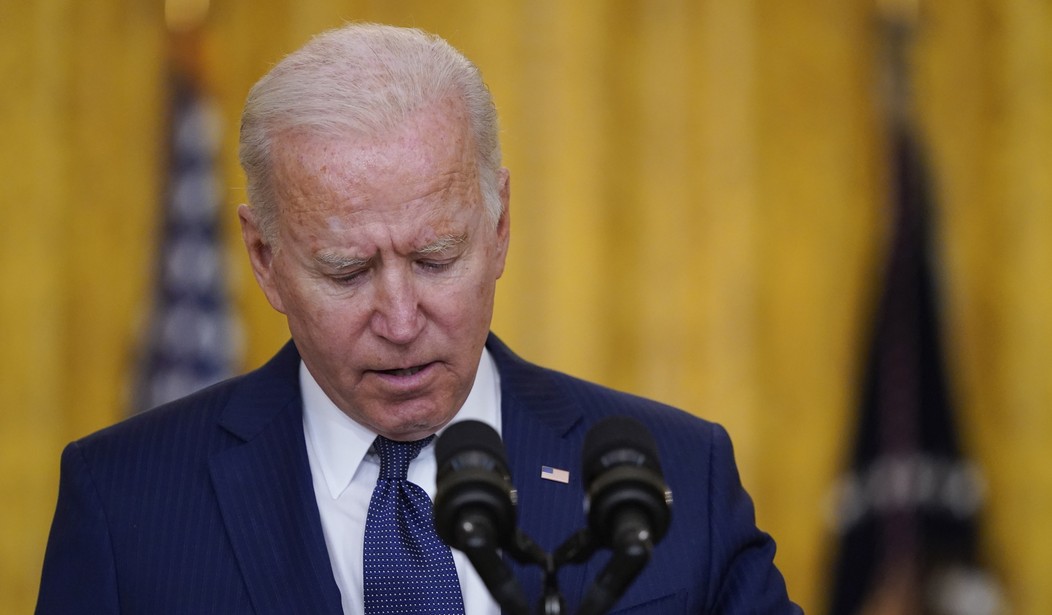The buck-passing continues for the historic disgrace of our retreat from Afghanistan, and this time perhaps back to the top. Zalmay Khalilzad’s work in both the Trump and Biden administrations as chief negotiator in Afghanistan has made him a handy target for those looking to shed their own culpability for the collapse and the moral stain of abandoning Americans to the Taliban. Khalilzad instead blames Ashraf Ghani for abruptly abandoning Kabul, although that argument leads inevitably back to Washington DC:
The US negotiator on Afghanistan has said that President Ashraf Ghani’s abrupt exit scuttled a deal for the Taliban to hold off entering Kabul and negotiate a political transition.
In his first interview since the collapse of the 20-year western-backed government, Zalmay Khalilzad, who brokered a 2020 deal with the Taliban to withdraw US troops, told the Financial Times that the insurgents had agreed to stay outside the capital for two weeks and shape a future government.
“Even at the end we had an agreement with the Talibs for [them] not to enter Kabul,” he said.
Actually, the agreement negotiated by Khalilzad supposedly guaranteed that the Taliban would not attack other cities as well. They were all supposed to participate in a political settlement that would have taken a few months at least to hammer out, with the US facilitating the process and guaranteeing security for the Afghan government. The Taliban had been violating the terms of that agreement for months, testing Joe Biden to see whether he would demand compliance and intervene when violations occurred, as Donald Trump allegedly threatened to do.
Those violations escalated all spring and into the summer, but the Taliban tore up the agreement altogether when Biden ordered Bagram abandoned and pulled all support for the Afghan army out of the country. With that betrayal of the pledge for guaranteed security, the army quickly folded under Taliban pressure in late July and early August. As anyone who worked in Afghanistan could have easily predicted, by the way, when Biden “pulled the plumbing” out of a fighting force designed to remain dependent on American support.
That’s why Ghani fled for his life, but as Khalilzad says next, the US then had an opportunity to secure Kabul on its own — guaranteed by the Taliban:
But Ghani fled on 15 August and the Taliban, in a previously arranged meeting that day with US Gen Frank McKenzie, chief of central command, asked if US troops would ensure security for Kabul as government authority crumbled.
“And then you know what happened, we weren’t going to take responsibility,” Khalilzad said.
Khalilzad confirms what has been reported before — the Taliban would have allowed the US to secure Kabul temporarily in order to complete its evacuation. At the very least, Khalilzad confirms that they made the offer, and strongly implies that the reason we didn’t was that Biden didn’t want to reinvest troops back into the city. In the end, he had to reinsert them into the airport anyway to secure a single point of egress, an ad-hoc tactical decision that left the US without any secure routes for Americans to get to the airport in the final chaotic fortnight.
Khalilzad’s explanation lays this at the feet of Biden in two ways. The decision to yank the military out first and all of its logistical, intel, and air support for the Afghan army led to the collapse and Ghani’s decision to escape. Second, Biden refused to secure Kabul to facilitate the evacuation of Americans. Both led directly to the Taliban takeover of Kabul and the abandonment of thousands of Americans — citizens and legal permanent residents — behind Taliban lines.
Khalilzad’s revelation touched off a contentious series of questions at the State Department briefing yesterday. Ned Price never did get around to answering Matt Lee’s question, however. Did the US ever bother to ask the Taliban for an extension? This picks up at the 35-minute mark or so and goes on for a while and involves other reporters too, but here’s a key part of the exchange between Lee and Price:
MR PRICE: I do not think he is contradicting that, and I think you have actually heard him say that the May 1 deadline was not something that we could have renegotiated. It is not something that the President or others in his administration were willing to risk, putting brave Americans in even greater danger to potentially use them as leverage or to extend an already overextended mission that had seen our service members and the U.S. Government accomplish the mission that was set out for them 10 years ago with the decimation of the al-Qaida network, with the killing of Usama bin Ladin. This was not a mission that the President was willing to see extended by another week, by another month, by another year, by another 20 years.
Will.
QUESTION: But Ned —
QUESTION: Yes —
QUESTION: — how do you know it was not something that you could have renegotiated? And to Nick’s point to what Zal is apparently saying is that the Taliban were essentially asking you to renegotiate it.
MR PRICE: That is not the case at all.
QUESTION: That’s not the case at all?
Biden didn’t want to extend it, even to get Americans safely out of Kabul? And Price acknowledges that the power vacuum existed, but Biden didn’t want to fill it — even for a couple of weeks? What an utter disgrace.
Update: I’ve updated the headline to reflect Khalilzad’s corroboration of earlier reporting on Kabul control.








Join the conversation as a VIP Member